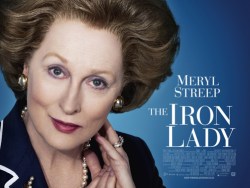Film Review: The Iron Lady – I want to see the extended edition
Wonderfully melodramatic, magnificently performed, tender and touching – I can’t wait for part 2. Except, there won’t be one. Phyllida Lloyd‘s The Iron Lady, with Meryl Streep in the roll of political giant Margaret Thatcher, is an unfinished film. It’s an openly emotional look at the personal life of the colossus, but it barely glances at her long and often (if not always) tumultuous political journey.
We begin with an aged and frail Maggie buying milk in her local newsagent. We slowly discover that she has escaped from her care worker for the morning; we learn that she still sees and talks to her long dead husband, Denis (played by Brit stalwart, Jim Broadbent); we learn that she is often confused and dazed and is now looking back over her life. This is the story of Thatcher’s personal life, from being inspired by her father to her meeting the young Denis Thatcher, from her early ambitions to be a force of change in the world to her ultimate disappointment with those around her.
I was eager to watch this film, excited to see Streep take on the mighty mountain that is the career of Baroness Margaret Thatcher and, as the proverbial curtain closed, my initial reaction was simply that Streep was superb. And with afterthought, I still maintain that she was. But she was not Margaret Thatcher. She played a strong but often tender, caring but often flawed, forthright but often fun-loving woman, who had some involvement in Britain’s political history. We did not see her portray the hardened battleaxe who took on the might of the unions and beat them down. We weren’t given a glimpse of the powerhouse’s unforgiving attitude towards the hunger-strikers. Rarely did we see her battles of wits with some of Britain’s biggest political figures, nor are we given the impression that she once overshadowed the President of the United States of America. I’m baffled that a film about one of the most contentious political figures of the 20th century decided to show her political career as nothing more than the backdrop of her life. Politics and The Fight are at the core of Margaret Thatcher.
 So, perhaps I’m being too damning. Lloyd, armed with Abi Morgan‘s screenplay, did not set out to make a political drama. She wanted to show us the woman, the wife, the mother, the lady behind the title. Should I judge the film based on that? Ok, I will.
So, perhaps I’m being too damning. Lloyd, armed with Abi Morgan‘s screenplay, did not set out to make a political drama. She wanted to show us the woman, the wife, the mother, the lady behind the title. Should I judge the film based on that? Ok, I will.
She falls in love with Denis – this whirlwind romance is presented in two scenes: one where he is bemused by her willingness to stand up to the men at a dinner part and another where she is losing her first election. After that, they appear to be blissfully happy together apart from a brief moment when Denis gives out to her for putting her job before her family (a plot point that is never addressed again). So much for showing us Maggie the Wife.
We first see her children well into their respective childhoods. There is no dramatic moment where we see the woman’s joy at discovering she’s be a mother to twins, no weepy birth scene, no harangued woman trying to change nappies and write political statements before breakfast. Instead, we jump forward to the day she decides to run for party leader, a decision she makes while teaching her daughter Carol how to drive. We are not privy to her feelings on Carol’s obsession with becoming a reality TV star or how Margaret felt about her son Mark’s playboy lifestyle or his involvement in an coup d’état in Equatorial Guinea. So much for showing us Maggie the Mommy.
Then, what is this film about? The pathetic end of a once-great political megalith? No, I don’t think we see that. The senility of an elderly woman, finding it difficult to let go of a husband she’s been mourning for 9 years? Maybe. The biased, softened and perhaps fictionalised view of a flawed leader that gained redemption in later years? Maybe so. I’m not sure what the ultimate aim of this film was. I do know that it fell far short of my hopes and expectations.
Should you go see it? Sure, why not! Streep does a great job of presenting a three dimensional woman of great integrity and wit. The script is intelligently written and often humorous. Streep’s co-stars are mostly brilliant. Broadbent is a very engaging Denis Thatcher. Olivia Colman nails the role of Carol Thatcher. It’s wonderful to see Anthony Head prove himself on the big screen (as Geoffrey Howe) and Richard E. Grant is solid, if underused, as Michael Heseltine (I can’t help but wish we were given a great debate between Streep and Grant’s Thacther and Heseltine).
It will not set your mind racing and it will not feed your hunger for political intrigue. Indeed, even from a film-making point of view it is flawed. It expects you to have some knowledge of British politics in the 70’s and 80’s, but also asks that you put aside full knowledge, truth and the populous opinion in favour of the movie’s biased view of the great Baroness Thatcher. Continuity is a major problem in this film. I’m actually shocked that I even have to mention it when talking about a big modern film. Moments when her necklace disappears and reappears around her neck depending on the camera angle, doors being open one moment and magically closed the next, only to reopen again mystically again are jarring for the film-goer. Rookie errors that really do scream out the fact that Phyllida Lloyd’s only major film prior to this was Mamma Mia! Incidentally, I think it would be worth naming and shaming the continuity adviser on The Iron Lady, but I could not find one listed. Ah, that explains it.
Overall, I gave this film a 5 out of 10 on IMDB. It’s very watchable, it’s entertaining, it’s amusing and very well performed. Now, let’s see someone else make a proper political movie about the merciless Margaret Thatcher.




Have yet to see, but heard it’s very much worth a look – if presenting Thatcher and the Tory party through rose-coloured spectacles (if that’s your impression?), and indeed lacking focus. And I was surprised from the trailers to notice Anthony Head in there (so use to him as a small screen presence). Great review Darren.
Cheers Emlyn. And this movie wasn’t made through rose coloured spectacles – they clearly forgot to wear their glasses at all.